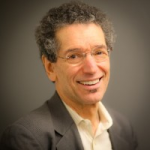One Pass Gives You Access To All Five Co-Located Conferences!
Register for any conference and enjoy all-access to every keynote, session, networking event, and exhibitions for all five co-located conferences.

David Osher
Senior Fellow, LPI | Education Collaboratory | EASEL Lab

Yale University School of Public Health | Harvard Graduate School of Education
David Osher is a Senior Fellow at the Learning Policy Institute, a fellow at the EASEL Lab at the Harvard University Graduate School of Education, and at the Yale University Education Collaboratory. His work focuses on understanding and addressing how intrapersonal, interpersonal, social, and organizational factors dynamically interact and affect education, safety, and mental health-related outcomes. Osher chaired the expert panel convened by the White House and Departments of Education and Justice to identify warning signs of school violence, and the expert panel convened with the Substance Abuse and Mental Health Services Administration identified evidence-based programs that prevent violence. Osher was a member of the working group that synthesized the scientific evidence supporting a public health-oriented action plan to prevent gun violence, consulted with the Council of State Governments Justice Center on its landmark Texas study and its School Discipline consensus report, and has testified before the US Senate and the US House on school safety and violence prevention. Osher developed five surveys to help schools and states promote safety and has consulted with schools, districts, states, and ministries worldwide. He was principal investigator of The National Center For Mental Health Promotion and Youth Violence Prevention; The National Center For Safe, Supportive, Learning Environments; The Safe and Supportive Schools Technical Assistance Center; The National Training Center For Safe School Coordinators; The Center For Effective Collaboration And Practice; The Technical Assistance Partnership For Child And Family Mental Health, And The National Evaluation And Technical Assistance Center For The Education Of Children And Youth, Who Are Neglected, Delinquent, And At Risk. His discipline and safety-related articles, chapters, books, and guides include:
- “The best approach to safety is to fix schools and support children and staff”
- “Creating responsive schools: Contextualizing early warning, timely response”
- “Deconstructing the pipeline: Using efficacy, effectiveness, and cost-benefit data to reduce minority youth incarceration”
- “The Safe School, Healthy Students Initiative: Lessons learned from implementing healthy youth development programs”
- “Warning signs of problems in schools: Ecological perspectives and effective practices for combating school aggression and violence”
- “Building school and teacher capacity to eliminate the school-to-prison pipeline”
- “How we can improve school discipline”
- “Team crisis: School psychologists and nurses working together. Psychology in the Schools,” Handbook of Classroom Management
- “Good Intentions Are Not Enough: Centering Equity in School Discipline Reform”
- “The Contribution of School and Classroom Disciplinary Practices to the School-to-Prison Pipeline” Handbook Of Classroom Management
- “The scientific evidence supporting an eight-point public health-oriented action plan to prevent gun violence” Keeping Students Safe And Helping Them Thrive
- The relational, ecological, and phenomenological foundations of school safety, mental health, wellness, and learning. Keeping Students Safe And Helping Them Thrive
- “Violence prevention in schools and communities: Multicultural and contextual considerations” Handbook of multicultural counseling
- “Interventions to promote safe and supportive school climate” Handbook of Social Influences in School Contexts
- “Avoid simple solutions and quick fixes: Lessons learned from a comprehensive district approach to improving conditions for learning” Closing the school discipline gap: Research for policymakers
- “Foundations of school violence and safety” Handbook of school violence and school safety
- Developing safe, supportive, and effective schools: Facilitating student success to reduce school violence” Handbook of school violence and school safety
- Safe, Supportive, Drug Free Schools What Works!
- Early Warning, Timely Response: A Guide to Save Schools
- Safeguarding Our Children: An Action Guide
- Teaching and working with children who have emotional and behavioral challenges
- Safe, supportive, and successful schools step by step
- Addressing the root causes of disparities in school discipline: An educator’s action planning guide
- Creating safe, equitable, engaging schools: A comprehensive, evidence-based approach to supporting students.
- Keeping Students Safe and Helping Them Thrive: A Collaborative Handbook on School Safety, Mental Health, and Wellness
- An empirical examination of the effects of suspension and suspension severity on behavioral and academic outcomes.
Osher’s expertise includes the science of learning and development; collaboration and service coordination; mental health services, supports, thriving, and well-being; and implementation. His related research includes alternative approaches to school discipline, understanding and addressing the effects of suspension and disciplinary disparities, trauma-sensitive approaches, and cultural competence and responsiveness. socio-cultural-historical processes; knowledge use; the conditions for learning and school climate, engagement; attendance, and chronic absenteeism; youth and family engagement; equity; collaboration; and leveraging AI. He is co-lead editor of the 2023 and 2025 Review of Research in Education. He is an AERA fellow and an elected member of the National Academy of Education. He is a historical sociologist who received his A.M. and P.hD. from Columbia University. He taught and served as dean of innovative schools at several colleges and universities. He received the President’s Award from The National Association Of School Psychologists, the Juanita Cunningham Evans Memorial Award for Contributions in School Mental Health and the Joseph Zins Distinguished Scholar Award for Outstanding Contributions to Action Research in Social and Emotional Learning.
